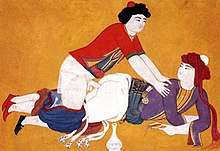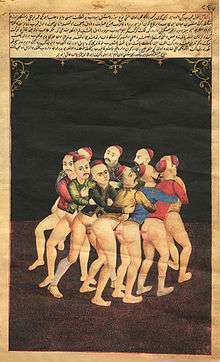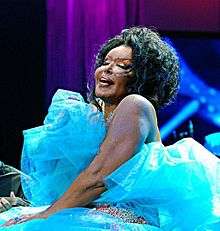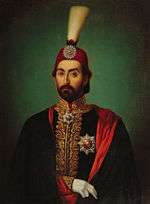LGBT history in Turkey
This article is about lesbian, gay, bisexual and transgender (LGBT) history in Turkey.

An illustration from the 19th Century book Sawaqub al-Manaquib depicting homosexual anal sex with a wine boy. Titled at source as "Spilling the wine".
Ottoman Empire

Homosexuality in the Ottoman Empire (Turkish miniature from 1773)
During the Ottoman Empire, The law no longer contains any explicit articles criminalizing homosexuality in 1858 as part of wider reforms during the Tanzimat period.[1]
Timeline
19th century

First openly transgender celebrity (singer) starts wearing makeup and feminine clothing in her performances and Turkish National TV (TRT) appearances during 70s.

Abdülmecid I, during the reign of whom the law no longer contains any explicit articles criminalizing homosexuality.

Ottoman illustration depicting a young man used for group sex (from Sawaqub al-Manaquib), 19th century.

- 1858 – The law in the Ottoman Empire (predecessor of Turkey) no longer contains any explicit articles criminalizing homosexuality.[2][3]
20th century
- 1970s – Bülent Ersoy - world's first openly transgender celebrity (singer) starts wearing makeup and feminine clothing in her performances and TV appearances, while being widely accepted as a woman (who was assigned male at birth).
- 1980s – Some openly gay people were able to be successful in the 1980s. Murathan Mungan has been openly gay throughout his professional life as a successful poet and writer. However, many gay and bisexual men who lived during this period have since said in interviews that they felt pressured, by social attitudes and government policy, to remain in the closet about their sexual identity.[4]
- 1993 – Lambda Istanbul is founded.
- 1993 – Organisers were denied permission to hold a LGBT pride parade. Similar opposition was expressed by the government in 1995 and 1996 for a LGBT film festival and academic conference. Government officials cited vaguely worded laws designed to protect public morality as justification for refusing to allow these public events to take place.
- 1994 – KAOS GL (Ankara) is founded.
- 1994 – ÖDP bans discrimination based on sexual orientation and gender identity within the party. Demet Demir of the ÖDP becomes the first transgender candidate to run for political office in Turkish history.
- 1996 – The Supreme Court overturned a lower court's ruling and removed a child from her lesbian mother on the grounds that homosexuality is "immoral".[5]
- 1996 – LEGATO is formed.
- 1997 – In April, Lambda Istanbul becomes the first Turkish LGBT NGO to be invited by the government to a government conference, namely the National Congress on AIDS; Hamam, a Turkish film featuring a gay romance, is released internationally and broadcast on state television.
21st century
- 2003 – The first ever gay pride parade in a predominately-Muslim country is held in Istanbul, Turkey. 30 people are in attendance.
- 2008 – 26-year-old Ahmet Yıldız is shot and killed by his father in Istanbul, in Turkey's first gay-targeted honor killing. His body remained unclaimed by his family, a grievous fate under Muslim custom.[6]
- 2008 – Gay pride is first observed in Ankara.
- 2009 – Football referee Halil İbrahim Dinçdağ was suspended by the Turkish Football Federation after he was outed as gay. He was also disavowed by friends and family.[7] In 2015, the Federation was ordered to pay compensation to Dinçdağ as a result of his lawsuit.[8]
- 2010 – Çukurova Homosexuals Initiative is founded with members from Adana, Mersin and Antakya.[9]
- 2013 – First pride parade in İzmir and in Antalya [10] [11]
- 2014 – The 2014 Pride march is considered to be the biggest yet, with more than 100.000 participants. It turned out to be one of the biggest LGBT Pride marches ever in Southeastern Europe. Politicians of the main opposition party, CHP, and another opposition party, BDP, also lent their support to the demonstration.[12]
- 2015 – For the first time, Turkish authorities banned the annual Gay pride parade in Istanbul. Police used tear gas, rubber bullets and water cannons against the marchers.[13][14]
- 2016 – The Istanbul Pride parade was banned by government authorities.[15]
- 2017 – The Istanbul Pride parade was banned by government authorities.[16]
- 2017 – The Ankara Governor's Office banned the German embassy's LGBT Film Festival.[17]
- 2017 – Turkey's first LGBT chorus 7 Color Chorus was established.[18]
- 2017 – On 17 November, the governor's office of Ankara banned the public showing of all films, exhibitions and events related to LGBT, citing "public sensitivities."[19] On 19 November, two LGBT rights organizations said they would launch a legal process against the decision.[20]
- 2018 – The Istanbul Pride parade was banned by government authorities citing security concerns.[21] Despite the ban organizers decide to do the march but Turkish police clashed with the crowd, using plastic bullets and tear gas to break them up.[22]
- 2018 – Turkish authorities in the Ankara banned the screening of movie Pride, a 2014 comedy-drama with LGBT themes, citing risks to public safety.[21]
- 2018 – the Adana Governor’s Office has banned the LGBT pride parade planned to take place on July over “possible incitement of hatred and hostility” among people.[23]
See also
References
- Ishtiaq Hussain (15 Feb 2011). "The Tanzimat: Secular Reforms in the Ottoman Empire" (PDF). Faith Matters.
- "Where is it illegal to be gay?". BBC News. Retrieved 11 February 2014.
- Jackson, Roy (2014). What is Islamic philosophy?. Routledge. p. 120. ISBN 9781317814047. Retrieved 24 June 2020.
- "Gay Identities". Qrd.org. Retrieved 2019-09-27.
- See report of Kaos GL: Turkey's LGBT History: The 1990s Archived 24 May 2009 at the Wayback Machine. Retrieved 16 October 2009.
- [Soul-Searching in Turkey After a Gay Man Is Killed https://www.nytimes.com/2009/11/26/world/europe/26turkey.html?pagewanted=all]
- "Five Dangers Facing the LGBT Community in Turkey". 6 December 2012.
- O'Brien, Zoie (2015-12-29). "Turkish football federation fined after sacking referee because he was gay". Express.co.uk. Retrieved 2018-04-21.
- "Çukurovalı eşcinsellerde örgütleniyor. (Turkish)". Kaos GL. Retrieved February 12, 2012.
- "İzmir'de İkinci 'onur Yürüyüşü' Düzenlendi".
- "Dünya Yerinden Oynar, Antalyalı Eşcinseller Özgür Olsa! - Kaos GL Haber Portalı". www.kaosgl.com. Archived from the original on 2016-02-03. Retrieved 2014-12-31.
- "100.000 KİŞİ! DİLE KOLAY!". POPKEDİ. Archived from the original on 2016-03-04. Retrieved 2015-07-30.
- "Istanbul Gay pride quashed by riot police, rubber bullets and water cannon". 28 June 2015.
- Muedini, Fait (2018). "LGBTI Rights in Turkey: Sexuality and the State in the Middle East". Cambridge University Press. doi:10.1017/9781108265133. Retrieved 2020-03-16.
- "LGBTİ+ Onur Haftası basın açıklamasına da Valilik'ten 'hassasiyet' yasağı! - Kaos GL Haber Portalı". kaosgl.org.
- "Governor's Office bans LGBT Pride March in Istanbul". hurriyet.
- "Berlin slams Ankara's ban on German LGBT film festival". Hürriyet Daily News.
- "Türkiye'nin ilk LGBTİ korosu". CNN Türk. March 2017.
- "Turkish capital bans all LGBT screenings, exhibitions, events over 'public sensitivities'". Hürriyet Daily News.
- "LGBT groups take legal steps after events banned in Ankara". Hürriyet Daily News.
- "Istanbul LGBT pride march will go ahead despite ban: organizers". www.reuters.com.
- "TURKISH POLICE CLASH WITH LGBT CROWD AFTER OFFICIAL PRIDE PARADE BANNED". www.jpost.com.
- "Adana Governor's Office bans LGBTI pride march". Hürriyet Daily News.
This article is issued from Wikipedia. The text is licensed under Creative Commons - Attribution - Sharealike. Additional terms may apply for the media files.